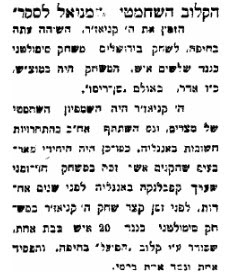 |
| Source: Al Ha'Mishmar, 22/5/53 , p. 4 |
Our frequent correspondent adds that there is a 'very surprising' note about Mona Karff in Israel, 1953.
Indeed so. Al Ha'Mishmar reports in its regular chess column a match between that the chess club in the town of Herzliya against the Reti club from Tel Aviv. It was a 10-board match, Herzliya winning 'for the first time' in a match between the two clubs, 5.5:4.5. (The Herzliya town chess club should not to be confused with the 'Herzliya' chess club from Haifa, which was based in Herzliya street in Haifa.)
Of particular interest is that 'Karff, the women's champion of Israel' played on the third board for the Reti club, drawing with Dr. Ritterband (ph. translation of ד"ר ריטרבנד).



